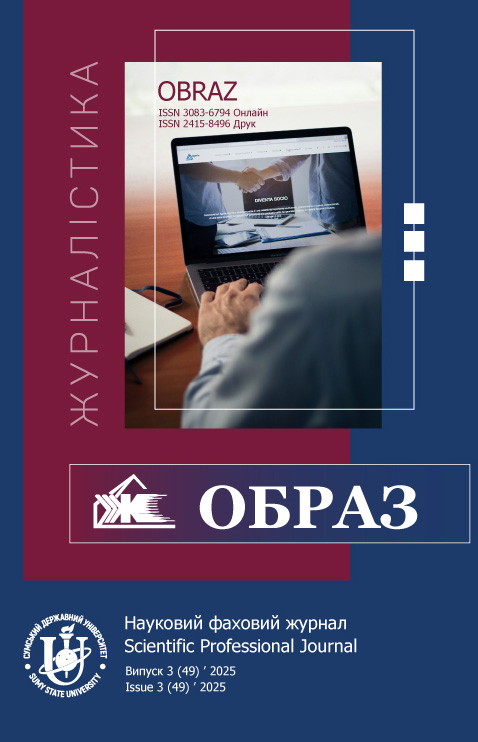Abstract
Introduction. The themes and content of gonzo journalism produced by Ukrainian authors over the past decade have been primarily focused on exposing the imperial nature of Russia’s aggressive war against Ukraine and revealing the sinister aspects of international politics that distort or undervalue the heroic defensive struggle of the Ukrainian people against Kremlin barbarism — a struggle for their natural right to live in an independent, national, and united Ukrainian state.
Relevance of the study. The study aims to define and characterize the gonzo-journalistic style and its expressive means, comparing them with the linguistic and stylistic tools of traditional journalism. The comparison is conducted in the context of the author’s conceptual and intentional framework, where verbal and audiovisual codes function jointly to form semantic, emotional, and pragmatic media resources designed to foster civic consciousness and moral-spiritual values among Ukrainians.
Methodology. The research methodology is based on general scientific principles of historicism, authenticity, concreteness, functionality, systematicity, cognitive approach, and modeling. Methods of content analysis, intent analysis, document study, observation, generalization, and descriptive analysis were employed.
Results. The contemporary model of Ukrainian gonzo journalism relies on diverse heterogeneous components that together create a unified informational image, amplifying and deepening the perception of the material’s meaning as well as the author’s referential, modal, and representative intentions.
The distinctive features of Ukrainian gonzo style include rhetorical constructions, grotesque, irony, hyperbole, contrast, antithesis, emotionality, speculation, and a sense of scale. Elements of gonzo stylistics, including the use of non-normative language, are typical of many texts directly or indirectly related to the full-scale Russian-Ukrainian war.
Conclusions. For the first time within Ukraine’s information and humanitarian space, this study attempts a comprehensive examination, interpretation, and generalization of the stylistic, expressive, and structural features of gonzo journalism in comparison with traditional (classical) journalism.
References
1. Kyrychenko I. (2021, 27 april) Political scientist Ihor Losiev: "If they give water, Ukraine can forget about Crimea". Ukraina moloda.
2. Tamony, P. (1983), «Gonzo», American Speech: A Quarterly of Linguistic Usage 58, no. 1 (1983):74
3. Wenner, J.S., Seymour, C. (2008), Gonzo: the life of Hunter Thompson/J.S. Wenner, C.Seymour. – New York: Back Bay Books. – 467 p.
4. Mosser J. What’s Gonzo about Gonzo Journalism? Literary Journalism Studies. 2012. Vol.4, No 1. P. 85–89.
5. Lerner, K. (2015), M. Gonzo Text: Disentangling Meaning in Hunter S. Thompson's Journalism. American Journalism. Vol. 32, no. 2. P. 241–243. URL: https://doi.org/10.1080/08821127.2015.1036695 (date of access: 13.01.2025).
6. Bauer Z., (2011) Dziennikarstwo “gonzo”: epizod czy trwaly trend w dziennikarstwe?[w:] Dziennikarstwo a literature w XX i XXI wieky, red. K. Wolny-Zmorzynsky, W.Furman, J.Snopek, Warszawa.
7. Frukacz K. Amerykanskie Nowe Dziennikarstwo po polsku? Transfer poetyk, problemy adaptacyjne. BIBLIOTEKA POSTSCRIPTUM POLONISTYCZNEGO. 2015. No. 5. P. 49–61.
8. Isager, Christine Skribenter der skaber sig: Hunter S. Thompson og Günter Wallraff som mønstre for retorisk handlekraft i den spektakulære personlige reportage. 2006. University of Copenhagen. 240 p.
9. Bowe, Brian J. (2012), A Brain Full of Contraband: The Islamic Gonzo Writing of Michael Muhammad Knight. Literary Journalism Studies. Vol.4, No.1, P.91 – 102.
10. Zyrek-Horodyska, E.(2017), Od amerykańskiego snu Thompsona po ukraiński Mordor Szczerka. Estetyzacja świata w duchu gonzo. Konteksty Kultury. Vol. 14, no. 2. URL: https://doi.org/10.4467/23531991kk.17.014.7538 (date of access: 13.01.2025).
11. Volkovynskyi, O. (2023). Gonzo Journalism in Ukraine: National and Regional Dimensions. In Regional Media in the Context of Contemporary Transformational Challenges: Proceedings of the All-Ukrainian Scientific Conference, Kamianets-Podilskyi, October 26, 2023 (pp. 5–8). Kamianets-Podilskyi.
12. Zelik O. IN GONZO STYLE: TETIANA TROFYMENKO’S LITERARY REVIEWS. Young Scientist. 2020. Т. 9.1, № 85.1. URL: https://doi.org/10.32839/2304-5809/2020-85.1-9 (дата звернення: 22.05.2025).
13. Ivantsiv M. The work of Serhiy Zhadan through the prism of explication of elements of gonzo journalism. Social Communications: Theory and Practice. 2023. Vol. 15, no. 2. P. 65–79. URL: https://doi.org/10.51423/2524-0471-2023-15-2-4 (date of access: 22.05.2025).
14. Sudarenko, O. (2017). Elements of Gonzo Journalism in the Regional Media Space (on the Example of the “Odobreno Utrom” Program on the Mariupol Television Channel). In Regional Mass Media of Ukraine: History, Current State, and Development Prospects: Proceedings of the Regional Scientific and Practical Online Conference, Starobilsk, March 22, 2017 (pp. 269–275). Starobilsk.
15. Zabolotska, O. O. (2014). The Role of Authorial Intention in the Formation of Textual Artistic Concepts. Visnyk of Taras Shevchenko Luhansk National University, (6(289), Part I), 171–180.
16. Boutammant M. The Idiosyncratic Perspective of Gonzo Journalism: Thompson’s “The Kentucky Derby is Decadent and Depraved” // Universiteit Leiden / Leiden University. − 4 January 2021.
17. Kalvø Daniel IMMERSION JOURNALISM How VICE Media Challenges the Norms, Methods, and Ideals of Mainstream Journalism / Master Thesis in Media Studies Department of Information Science and Media Studies University of Bergen.− May 2015. – 81 p.
18. Adamczewska, I. (2014) “Wariacje na temat pewnego paktu. O dziennikarstwie gonzo” Lodzkie Studia Literaturoznawcze,. 3(1), s. 187 – 204.
19. Pryliuk, D. M. (1973). Theory and Practice of Journalistic Creativity: Methodological Problems. Kyiv: Vyshcha Shkola Publishing Association. 271 pages.
20. Mazurkova, O. (2025, February 19). “A European Nightmare”: What Happened at the 61st Security Conference in Munich. Ukraina Moloda.
21. Yeriomin, A. (2025, February 20–25). German Media After Vance’s Speech: America Won’t Protect Us, So Let’s Get to Work! Vysokyi Zamok.
22. Palyvoda, N. She Came to Apologize for Scholz. Facebook. Retrieved May 22, 2025, available at https://www.facebook.com/share/p/1DieEYPo51.

This work is licensed under a Creative Commons Attribution 4.0 International License.

